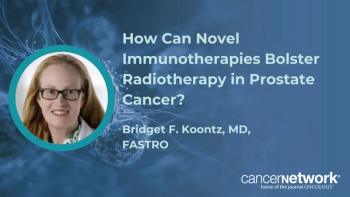
Oncology NEWS International
- Oncology NEWS International Vol 10 No 2
- Volume 10
- Issue 2
RT for Prostate Cancer May Offer Better Erectile Function
BOSTON-One year after prostate cancer treatment, men who had radiation therapy were more likely to be able to maintain an erection than those who had radical prostatectomy, according to a study presented at the 42nd Annual Meeting of the American Society for Therapeutic Radiology and Oncology (ASTRO).
BOSTONOne year after prostate cancer treatment, men who had radiation therapy were more likely to be able to maintain an erection than those who had radical prostatectomy, according to a study presented at the 42nd Annual Meeting of the American Society for Therapeutic Radiology and Oncology (ASTRO).
John W. Robinson, PhD, clinical psychologist, University of Calgary and Tom Baker Cancer Centre, Calgary, Alberta, Canada, reported that brachytherapy produced the best results76% of patients had erectile function at 1 year. Cryotherapy had the worst results, with only 14% of patients able to have an erection at 1 year after treatment.
In between were external beam radiation therapy (68%), brachytherapy combined with external beam radiotherapy (58%), nerve-sparing radical prostatectomy (58%), and standard radical prostatectomy (30%).
"All other things being equal, I would recommend radiation therapy," said Dr. Robinson, who specializes in the effects of cancer treatment on sexuality. He began the study, he explained, because patients often come to him for help in choosing among treatments.
"Patients ask, ‘What is the likelihood that I’m going to be able to have erections afterward?’" he told ONI in a postconference interview. He explained that he was uncomfortable answering based on the information available.
Not finding any standardized trials comparing treatments with respect to erectile function, Dr. Robinson and his colleagues based their analysis on 86 journal articles published from 1970 to 2000. Patients in these studies had their erectile function assessed both before and after treatment. The researchers only considered studies that reported data on men who were able to hold an erection for intercourse prior to treatment, he said, and were careful not to include duplication of the same patient data.
Dr. Robinson said that drawing inferences from the results of this meta-analysis is difficult because the age and condition of the patients could tilt the analysis.
"Radiation therapy is often used on older and sicker patients," he said. "If the patients were younger with less advanced diseaselike those often treated with surgerythen the percentage of patients who maintain erectile function following radiation therapy would likely be even higher." Conversely, he speculated that brachytherapy might have had the best results because it is usually used in patients with smaller tumors and lower-stage disease.
As for cryotherapy, Dr. Robinson said, "it seems to be a lot harder on erectile capabilities than other treatments." The freezing of the neurovascular bundles and the placement of probes through the penis might do some damage, he speculated, adding that the hope is these nerves can regenerate over time.
Dr. Robinson said he was encouraged that some clinical trials assessing erectile function after prostate cancer treatment are now taking place.
"Most consensus panels come to the conclusion that cure rates are equivalent for radiation therapy and prostatectomy," he said. "Hence, quality-of-life data become very important when we try to help patients make decisions about which treatments are best for them."
He added, however, that while he favors doctors being able to give patients more information about erectile function after prostate cancer treatment, he is worried that people are taking "a very myopic view of male sexuality."
Dr. Robinson said that physicians should encourage people to take a broader perspective of sexual arousal. "There’s so much focus on erectile function, on the belief that if you can’t get an erection, your sex life is over," he said. "A lot of men don’t know they can have an orgasm even if they can’t have an erection."
Articles in this issue
about 25 years ago
Activated T Cells Can Alter Behavior of Leukemic B Cellsabout 25 years ago
Response Continues for at Least 8 Months with Ibritumomab Tiuxetanabout 25 years ago
Synthetic Anthracycline Produces High Response Rates in SCLCabout 25 years ago
Ibritumomab Tiuxetan Produces 73% Response Rate in B-cell NHLabout 25 years ago
G-CSF Might Prolong Rituximab Responses in NHLabout 25 years ago
Use of CAD Increases the Early Detection of Breast Cancer by 20%Newsletter
Stay up to date on recent advances in the multidisciplinary approach to cancer.



















































